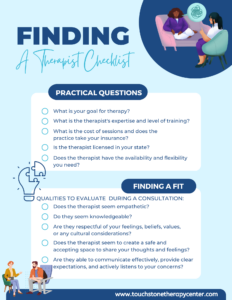Blog
Tips on Finding the Right Therapist for You
When should you seek support for mental health? If you’re feeling overwhelmed, struggling to manage your emotions, or experiencing persistent sadness or anxiety, seeking support can be a crucial step in your journey towards healing. Don’t be afraid to reach out to a mental health professional, support group, or crisis hotline. Remember, asking for help is a sign of strength, not weakness.

Many people may feel overwhelmed by the prospect of finding a therapist, but it’s important to remember that finding the right therapist for you is an essential part of the process. Finding a therapist can be a difficult task but there are some tips on how to find the right match for you. Making an informed decision about a therapist will help increase your confidence in that first therapy appointment.

The practical side of finding a therapist is just as important as the personal and emotional side. While a therapist’s biography may look impressive, you need to make sure that they can actually meet your needs. Looking at the list below, you can narrow down your options and make a more informed decision about which therapist will be the best match for you.
1. Consider your needs: Think about why you’re seeking therapy and what you hope to achieve from it. This will help you identify the type of therapist that might be best suited for you.
2. Look for a licensed therapist: Make sure that the therapist you choose is licensed by the state in which they practice. This ensures that they have met the necessary requirements to practice therapy in that state.
3. Check their expertise: Different therapists have different areas of expertise. If you’re seeking help for a specific issue, look for a therapist who has experience in that area.
4. Read reviews and testimonials: Look for reviews and testimonials from other clients to get an idea of what it’s like to work with that therapist. This can give you a sense of their approach and whether or not it might be a good fit for you.
5: Consider the cost and insurance coverage: Therapy can be expensive, so it’s important to consider the cost of sessions and whether or not your insurance will cover it. Some therapists offer a sliding scale fee based on income, which can make it more affordable.
6: Schedule a consultation: Many therapists offer a free initial consultation to potential clients. This can give you a chance to ask questions, get to know the therapist, and determine if they’re a good fit for you.

Remember, finding the right therapist is an important part of the therapy process, so don’t be afraid to take your time and ask questions before making a decision. The therapeutic alliance, which is the quality of the relationship between the therapist and client, is consistently identified as a key predictor of therapy success across different therapy modalities. Consultations are a common practice among therapists and are beneficial for both the client and the therapist. They provide an opportunity for both parties to determine whether they are a good match before committing to ongoing sessions. This saves time and effort for both the client and the therapist, as scheduling, insurance verification, and paperwork can be exhausting if it turns out that the therapist is not the right fit. If a potential therapist agrees to a consultation before booking an appointment, it’s important to use this time to assess whether they meet your needs. Consider the factors below when communicating with a potential therapy. By evaluating these qualities during the consultation, you can make an informed decision about whether to proceed with therapy with that particular therapist. The tips below will help you narrow down the best fit for you.

1. Empathy: A good therapist should be able to understand and empathize with your experiences and emotions.
Good communication skills: A therapist should be able to communicate effectively with you, listen actively to your concerns, and be able to provide clear explanations and feedback.
2. Respect: A therapist should be respectful of your feelings, beliefs, and values.
3. Trustworthiness: A therapist should be trustworthy and maintain confidentiality in accordance with ethical standards.
4. Knowledgeable: A good therapist should be knowledgeable about various types of therapy, mental health conditions, and treatment options.
5. Non-judgmental: A therapist should be non-judgmental and create a safe and accepting space for you to share your thoughts and feelings.
6. Good boundaries: A therapist should maintain appropriate boundaries with you and ensure that the therapeutic relationship is focused on your needs and goals.
7: Professionalism: A therapist should conduct themselves in a professional manner and adhere to ethical standards and codes of conduct.
Overall, it’s important to find a therapist who you feel comfortable with and who has the qualities that are important to you. Trust your instincts and don’t be afraid to try different therapists until you find one that feels like a good fit for you.
